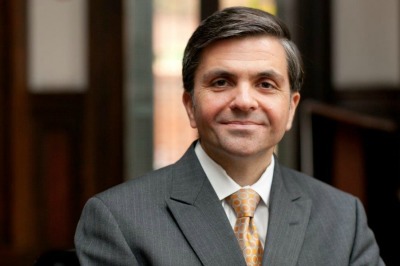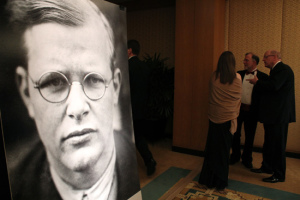What Wesleyans Can Learn From Lenin

Last month was the 100th anniversary of the Bolshevik Revolution led by Russian Marxist Vladimir Lenin, from which rivers of blood and tides of untold human suffering flowed across the 20th century.
So it was notable in October when United Methodist theologian William Abraham of Southern Methodist University recalled a 2007 presentation by prominent United Methodist thinker Theodore Jennings called "What Wesleyans Can Learn from Lenin."
Here's what Abraham said:
Jennings had mined Wesley for suitable quotes that could be used to convince gullible audiences that Wesley was best understood through the lens of liberation theology. The sinister truth on this front hit home for me dramatically at a later meeting of the Oxford Institute when Jennings presented a paper, entitled, "What Wesleyans can Learn from Lenin". I recall vividly the spot in a bookstore in Oxford when it dawned on me that the final outcome of this reading of Wesley was not just false; it was morally and theologically obscene. One of the great thugs and murderers of the twentieth century was called in as a resource for Wesleyan reflection on politics. To say the least, this was a significant intellectual epiphany. I am sure that Lenin would have been delighted to have used Jennings' work as that of a useful idiot.
Jennings is an ordained United Methodist minister who recently retired from the United Church of Christ's Chicago Theological Seminary. He's the author of many books, including Good News to the Poor: John Wesley's Evangelical Economics, published in 1990. Years ago I attended a special seminar of the Winchester District of United Methodism's Virginia Conference that featured Jennings discussing this book. His presentation was politically left of center but didn't mention Lenin! His biography notes he's a "consultant to the United Methodist Bishops on issues of poverty." He delivered his Lenin paper to the 2007 Oxford Institute of Methodist Theological Studies in a session on "Ethics, Economics, and Globalization."
"I am aware that Lenin, as the founder of the Soviet Union might still be regarded with some suspicion," Jennings admitted in his paper with considerable understatement. But, "I believe that there is still a good deal that we can learn from a reading of Lenin," who "saw important parallels between revolutionary socialism and early Christianity and would no doubt have endorsed Wesley's own view that the darkest day in Christian history was the day that Constantine called himself a Christian."
Noting that Lenin's mother was Lutheran, Jennings recalled Lenin earlier in his revolutionary career defended Protestant "sects" in Russia, indicating "that Lenin need not be regarded as the sworn enemy of all religion, especially of that which seeks to recover the radical impulses of early Christianity."
Jennings observed that, since some Marxists have borrowed ideas from early Christianity, then as "we contemplate the magnitude of the Empire that we now face and think about ways in which not only primitive but also contemporary Christianity may be helpfully engaged in the contestation of empire I think we can return the favor as it were and learn something from Lenin."
Additionally, Jennings said: "The lesson for us from this is that we need to find ways to get outside a narrow preoccupation with our own 'base' of church and be in solidarity with all movements that resist the military hegemony and capitalist domination of the planet."
Jennings suggested that "we encounter perhaps the greatest help from Lenin, in his analysis of 'imperialism as the highest stage of capitalism.'" Citing modern banking and pharmaceutical industries, Jennings added: "Even though Lenin was writing 90 years ago he was already able to see some of the most important dynamics of the globalization of capital."
While the "age of colonialism is over," Jennings said, "The job is much more efficiently done by instruments of economic control" and by the "extension of military presence, especially of the United States in many nations around the globe; a form of insurance against any attempt at meaningful economic autonomy on the part of any nation unwise enough to insist on real sovereignty."
Jennings regretted: "One of the great tragedies of 20th century theology is the way in which theology and the churches, especially in the US have become utterly silent concerning the economic-military mechanisms by which the whole planet is brought into subservience to the interests of plutocratic powers."
So, Jennings said, "We could learn a lot from seriously engaging the insights of Lenin in this respect."
Jennings also enthused that Lenin was instructive because he "understood the Party as a vanguard that would function as a tribune for the people in all their just grievances against the dominion of avarice and arrogance" and "saw the need for the training of persons who would be the carriers of this theory and practice, who would be trained as propagandists who exposed the horrors of the system and as agitators who would organize militant resistance among the sectors of the population that were suffering from this domination."
Lenin "supposed that secrecy and even deception as well as violence would be necessary to overcome these structures," Jennings acknowledged. "And while one can certainly understand the logic of that supposition in the context of czarist Russia (and many other contexts besides) it has become all too clear that one cannot achieve a transparent society by means of falsehood, nor a democratic socialism by means of violence."
Jennings opined that the "transformation we seek can only be achieved by other means that are even more arduous that those proposed for the party militant" for "the establishment of communities that embody an anti-imperial polity within the context of lethal empire."
Recalling Marxist dogma's expectation that eventually pure communism would make government unnecessary, Jennings surmised:
We may also join with Lenin in imagining an end to the state and indeed that the aim of radical transformiative action is not the capture of the mechansims of the state but the abolition of these mechanisms. While Lenin supposed that the transitional stage would entail the "dictatorship of the proletariat" we may have the harder work of imagining the deployment of a completely different sort of power, perhaps what St Paul imagined as the power/weakness of the cross.
Jennings suggested that heirs of Saint Paul and John Wesley "can and must learn from Marx and Engels, Lenin and Luxemburg ways of both understanding and transforming our own context of empire" to "take up the cause of all who labor and are heavy laden, of all who suffer from the globalization of greed and arrogance," and "by fostering cells of militant messianic community that awaken hope, enable resistance, effect a counter sociality governed not by statist legality but by the messianic law of love and unrestricted hospitality."
It's of course absurd that John Wesley would accept Jennings' counsel to learn from Lenin, a frozen-blooded materialist who despised all the truly humane values deeply associated with Christianity. Tragically, in the 20th century some Christian intellectuals and Methodist activists were beguiled by the turgid rhetoric and promises of Marxism-Leninism, ignoring its inevitable butchery, torture, prison camps and coercive propaganda.
Christian anthropology and authentic Wesleyanism in particular offer a very different political theology premised on the divinely ordained sacred nature of each human individual. After his critique of Jennings, Abraham offered helpful insights into Wesley's own vision for a Christian-influenced society seeking approximate justice, which I'll address in my next blog.
Originally post at Juicy Ecumenism.com.




























